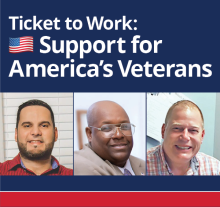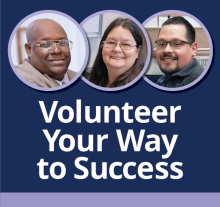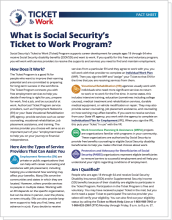Social Security makes every effort to ensure that any information published is accurate and up to date, but some information on this webpage may be historical.
-
Frances' Success Story
As Frances managed recovery after a stroke, she had to work hard to find a new job in the medical field that she loved so much, and thrived in. With perseverance, surprising motivational sources and help from Social Security's Ticket to Work Program, she has returned to the medical field to help the patients she missed.
Read more... -
Ticket to Work: Support for America’s Veterans
Military veterans have a lot to offer employers. For veterans receiving Social Security Disability Insurance (SSDI) or Supplemental Security Income (SSI), Social Security’s Ticket to Work Program offers help to identify transferable skills and find civilian jobs. Veterans Angel, Robert and Jeff received help to transition to the civilian workforce. Read more.
Read more... -
Ticket to Work and Project SEARCH Enable Successful Launch for Grad with Autism Spectrum Disorder
When Adrienne, a young woman with autism spectrum disorder (ASD), was ready to graduate from high school, her parents were uncertain about how to help their daughter lead a full life after high school. With a collaborative effort of local agencies and Social Security’s Ticket to Work Program, Adrienne now has a rewarding career. Read more.
Read more... -
Kushal’s Success Story
As Kushal manages muscular dystrophy, he has overcome challenges to keep his health care benefits as he progressed in his career and increased his income. With over ten years of hard work and help from Social Security's Ticket to Work Program, he has reached his educational, employment and financial goals. Read more.
Read more... -
Volunteer Your Way to Success in the Workforce
Do you have volunteer experience or looking to gain some? You can turn your volunteer experience into work opportunities. Learn how Ticket to Work helped Hazel, Robert and Jesus turn their volunteer skills into work skills. Read more.
Read more... -
Road Warrior: Jeff's Story
After a motorcycle accident sent Marine veteran Jeff off course, he used the Marine Corps’ mindset to ‘improvise, adapt and overcome’ with help from Social Security’s Ticket to Work Program, to find a new route forward. With the help of his State VR agency Jeff returned to school, maintained employment and found his road to financial independence.
Read more... -
Make the Most of Your Ticket: Work with your State VR Agency and an Employment Network
Did you know that if you're eligible for Social Security's Ticket to Work Program, you have the option to work with your State VR agency and an EN? Let's explore how this works and the experiences of Amy and Jason.
Read more... -
Andy's Circle of Support
As Andy prepared to finish high school, he and his family considered his career options and realized there were programs in place to help him enter the workforce. With the help of his high school transition team, his Ticket to Work employment team and Project SEARCH, Andy found a job he loves. Learn how they all worked together to help Andy succeed.
Read more... -
Rebecca's Story
After going into remission from cancer, Rebecca decided she wanted to return to work in a new field. While exploring her options, she received information in the mail about Social Security’s Ticket to Work (Ticket) Program. After calling the Ticket to Work Help Line to learn more, Rebecca connected with an Employment Network that could provide the support she needed to navigate a career transition.
Read more... -
What is Social Security's Ticket to Work Program?
Ready to work and looking for support on your employment journey? If you are age 18 through 64, receive Social Security disability benefits (SSDI/SSI) and want to work, the Ticket to Work (Ticket) Program can help you reach your employment goals! This fact sheet tells you what you need to know to get started.
Read more...Tags: disability employment, friends and family, resources, social security disability benefits, ssdi, ssi, ticket to work, work incentivesCategories: Fact Sheets & Resources








